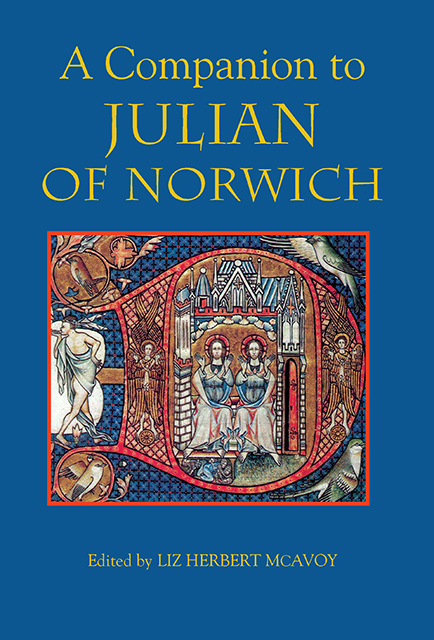4 - Julian of Norwich and the Varieties of Middle English Mystical Discourse
Published online by Cambridge University Press: 10 March 2023
Summary
Writing near the end of the fourteenth century, the anonymous author of the Cloud of Unknowing warns his disciple that the language of spirituality is radically metaphoric:
& þerfore beware þat þou conceyue not bodely þat þat is mente goostly, þof al it be spokyn in bodely wordes […] For þof al þat a þing be neuer so goostly in itself, neuerþeles 3if 3it it schal be spoken of, siþen it so is þat speche is a bodely werk wrou3t wiþ þe tonge, þe whiche is an instrument of þe body, it behoueþ alweis be spoken in bodely wordes. Bot what þerof? Schal it þerfore be taken & conceyuid bodely? Nay, it bot goostly.
The Cloud author's remark is usually regarded as a criticism of the sensational language of the first Middle English mystic, Richard Rolle (c.1300–49), and other literal-minded practitioners of contemplation. However, his words also provide a warning to those who study texts about mysticism: we must regard them as metaphoric discourse rather than as literal accounts of experience.
Over the last two decades, scholars have heeded the Cloud author's advice and focused greater attention on the language contemplative writers employ rather than any experience informing their texts. In his magisterial three-volume study, The Presence of God, for example, Bernard McGinn acknowledges that since readers can never have access to the mystic's consciousness, they can only explore the language he or she uses to describe it. Like the Cloud author, McGinn recognizes the metaphoric complexity of texts about mysticism and compares their deployment of language to poetry:
Mystical masterpieces … are often close to poetry in the ways in which they concentrate and alter language to achieve their ends … [and employ] verbal strategies in which language is used not so much informationally as transformationally, that is, not to convey a content but to assist the hearer or reader to hope for or to achieve the same consciousness.
In his study of the apophatic tradition, The Darkness of God, Denys Turner also insists that one can only study the mystic's language. Despite the continuity of metaphors of interiority and ascent, of light and darkness, and of oneness with God in the Christian discourse of spirituality, he contends that the meaning of these metaphors is radically different for medieval and modern writers.
- Type
- Chapter
- Information
- A Companion to Julian of Norwich , pp. 53 - 63Publisher: Boydell & BrewerPrint publication year: 2008
- 1
- Cited by

